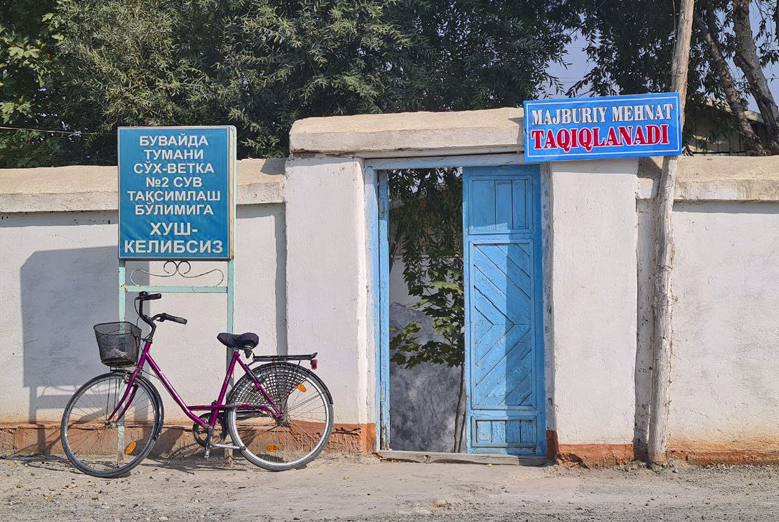Uzbekistan: Independent Monitoring Shows Human Rights Risks Remain in the Cotton Industry Despite Reforms that Ended State-Imposed Forced Labor
September 2022, Buvayda district, Ferghana region, Uzbekistan. Poster at the entrance of the district water distribution organization: “Forced labor is prohibited”. © Uzbek Forum
Cotton Campaign Urges Robust, Worker-driven Prevention and Mitigation Mechanisms at All Stages of Production
Download Uzbek Forum’s Cotton Chronicle 2022: Observations Of Uzbekistan’s Cotton Harvest
(Washington, D.C.) The Uzbek government and local cotton companies should take immediate action to safeguard the progress made to end state-imposed forced labor in the cotton harvest and develop a cotton industry that meets international labor standards, the Cotton Campaign said. Preliminary findings of independent civil society monitoring of the 2022 cotton harvest published in Uzbek Forum’s Cotton Chronicle 2022: Observations Of Uzbekistan’s Cotton Harvest show that while political will to end forced labor remains strong, the progress achieved so far could be in jeopardy and reform must be reinforced. Human rights risks remain in the Uzbek cotton industry, including the risk of forced labor and exploitation of farmers.
“This harvest, the first one since the Uzbek government effectively ended state-imposed forced labor, has shown that without worker driven mechanisms to monitor and report labor rights violations, the reforms are at risk”, said Allison Gill, Forced Labor Program Director at Global Labor Justice-International Labor Rights Forum (GLJ-ILRF), which hosts the Cotton Campaign. “Freedom of association for workers and farmers is essential to develop and maintain a cotton industry that is free of forced and exploitative labor.”
The remaining risks underscore the urgent need for the industry and government to engage with civil society, farmers and workers, and their legitimate representatives, and establish robust mechanisms to prevent and mitigate rights violations at all stages of production. Establishment of these mechanisms is the only way to turn Uzbekistan into a key sourcing country for sustainable cotton and textiles, the Cotton Campaign said.
Preliminary findings show that key high-level officials send consistent messages that local officials should not use forced labor or coercion. However, despite the abolition of the state order for cotton production, the government continues to exert strict control of the harvest and de facto production targets for individual districts persist. Uzbek Forum monitoring identified cases where pressure on district and regional government authorities to meet production targets has led to cases of forced labor in districts with insufficient voluntary labor. Furthermore, farmers are vulnerable to exploitation by cotton companies (known as “clusters”), with thousands of farmers reportedly being forced to sign blank contracts with no guaranteed minimum price, but often with inflated production targets.
“Following the lifting of the Cotton Pledge, global apparel brands are watching Uzbekistan and looking for signs of diminishing risks that would encourage them to begin sourcing from the country”, said Bennett Freeman, Cotton Campaign co-founder and former U.S. Deputy Assistant Secretary of State for Democracy, Human Rights and Labor. “The Uzbek government and clusters should address the remaining gaps and demonstrate their commitment to international labor rights standards. Now is the time for reform to move forward, not backward.”
In an encouraging signal, social media reports and evidence documented by Uzbek Forum monitors indicate that efforts to coerce people into going to the fields appeared to stop as soon as the information became public and that the authorities responded promptly. Similarly, high-level government officials have taken action in some cases of illegal land confiscations or police violence against farmers, after these were reported in the media. However, ad hoc interventions are not enough to cement the progress made to end state-imposed forced labor and attract global brands and retailers to make investments in the long term in Uzbekistan, the Cotton Campaign said.
At present, conducting human rights due diligence at each stage of production would be a real challenge for any brand interested in sourcing from Uzbekistan. A main reason is the low capacity for independent monitoring on the ground, which is exacerbated by constraints on freedom of association and continuing restrictions on independent civil society groups to register and operate.
“To encourage responsible sourcing of yarn and textiles from Uzbekistan, the Uzbek government and clusters must embrace the positive role civil society and workers themselves can play in ensuring labor rights are upheld,” said Raluca Dumitrescu, Coordinator of the Cotton Campaign. “This will give companies the assurances they seek that if they begin sourcing from Uzbekistan, they will not be violating national laws governing human rights due diligence, supply chains, and imports.”
Through consultation with stakeholders, the Cotton Campaign launched the Framework for Responsible Sourcing to ensure that after the lifting of the Pledge, brands and their suppliers can begin responsibly sourcing yarn, fabric, and finished goods from Uzbekistan. The Cotton Campaign is engaging with global brands and the Uzbek industry to develop pilot programs based on international best practice and co-governance models, to establish worker-driven mechanisms for prevention and mitigation of human rights risks.
The 2022 cotton harvest is expected to conclude in all districts by late November. The preliminary findings reflect the evidence collected between September-October 2022. Uzbek Forum will publish an in-depth analysis of the full findings in the first quarter of 2023.
———
The Cotton Campaign is a coalition of human and labor rights NGOs, independent trade unions, brand and retail associations, responsible investor organizations, supply chain transparency groups, and academic partners, united to end forced labor and promote decent work for cotton workers in Central Asia.
Global Labor Justice - International Labor Rights Forum (GLJ-ILRF) is a newly merged organization that brings strategic capacity to cross-sectoral work on global value chains and labor migration corridors. GLJ-ILRF is coordinating and hosting the Cotton Campaign.
Uzbek Forum is a Berlin-based NGO dedicated to improving the human rights situation in Uzbekistan and strengthening and promoting civil society. Uzbek Forum has conducted independent monitoring of the Uzbek cotton harvest every year since 2010.


